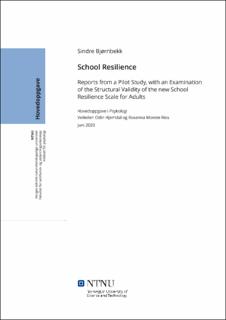| dc.contributor.advisor | Odin Hjemdal | |
| dc.contributor.advisor | Roxanna Morote Rios | |
| dc.contributor.author | Sindre Bjørnbekk | |
| dc.date.accessioned | 2021-09-13T16:18:51Z | |
| dc.date.available | 2021-09-13T16:18:51Z | |
| dc.date.issued | 2020 | |
| dc.identifier | no.ntnu:inspera:55450544:5746645 | |
| dc.identifier.uri | https://hdl.handle.net/11250/2776061 | |
| dc.description.abstract | Sammendrag
Skoler spiller en sentral rolle i utviklingen av mental helse og velvære hos barn og unge. En stor mengde forskning støtter dette, og viser klare sammenhenger mellom egenskaper ved skoler og mental helse-relaterte utfall for studenter. Resiliens er et viktig konsept i mental helse-forskning, relatert til faktorer og prosesser som fremmer positive utfall for individer og lokalsamfunn. The nye konseptet skoleresiliens er knyttet til de kollektive ressursene til skolesamfunnet. The School Resilience Scale (SRS) er et spørreskjema som nylig ble utviklet av forskere fra Resilienssenteret ved Norges teknisk-naturvitenskapelige universitet, Trondheim. SRS består av fem foreslåtte faktorer: positive relasjoner, tilhørighet, inkludering, deltagelse, og mental helse. Forskning som støtter relevansen til faktorene presenteres i litteraturgjennomgangen. Hovedmålet til denne oppgaven er å bidra til valideringen av the School Resilience Scale for voksne (SRS-A), gjennom undersøkelse av om SRS-A i sin nåværende form viser akseptable psykometrisk egenskaper, i et bekvemmelighetsutvalg (N = 342) av lærere og foreldre fra fem europeiske land. Dette vil i neste omgang si noe om hvorvidt skalaen som den er kan brukes i forskning på skoleresiliens. En bekreftende faktoranalyse er utført i SPSS AMOS, for å teste hvor passende den foreslåtte fem korrelerte faktorer-modellen til SRS-A er. Den bekreftende faktorer analysen støttet at den nåværende SRS-A modellen passer. I tillegg ble den interne konsistensen til skalaen og hver av de fem foreslåtte faktorene testet med reliabilitetsanalyser. De interne konsistensene til hele skalaen og de fem faktorene spant fra akseptable til høye. Til sist ble preliminære effekter av demografiske variables utforsket gjennom t-tester for uavhengige utvalg og korrelasjonsanalyser. Å være en lærer og økt alder var forbundet med høyere skårer på SRS-A og noen av de fem faktorene. Resultatene fra denne studien viser at SRS-A i sin nåværende fem korrelerte faktorer-struktur er passende for bruk i videre valideringsstudier. Framtidige retninger i forskning på skoleresiliens blir diskutert.
Nøkkelord: Resiliens, skoleresilins, the School Resilience Scale for Adults, bekreftende faktoranalyse. | |
| dc.description.abstract | Abstract
Schools play a pivotal role in the development of mental health and well-being in children and adolescents. In fact, a vast amount of research supports this notion, showing clear relations between characteristics of schools and mental health related outcomes for students. Resilience is an important concept in mental health research, related to the factors and processes that promote positive outcomes in individuals and communities. The novel concept of school resilience is concerned with the collective resilience of the school community. The School Resilience Scale (SRS) is questionnaire recently developed at the Resilience Centre of the Norwegian University of Science of Technology, Trondheim. The SRS consists of five proposed factors: positive relations, belonging, inclusion, participation, and mental health. Research supporting the relevance of the factors is presented in the literature review. The principal aim of this thesis is to contribute to the validation of the School Resilience Scale for adults (SRS-A), by examining if the SRS-A in its current form show acceptable psychometric properties, in a convenience sample (N = 342) of teachers and parents from four European countries. This will in turn inform whether the scale as it is can be used in research on school resilience. A confirmatory factor analysis has been conducted in SPSS AMOS, testing the adequacy of the proposed five correlated-factors model of the SRS-A. The confirmatory factor analysis supported the adequacy of the current SRS-A model. In addition, the internal consistencies of the scale and each proposed factor have been tested with reliability analyses. The internal consistencies of the entire scale and the five factors ranged from acceptable to high. Finally, preliminary effects of demographic variables have been explored through independent samples t-tests and correlation analyses. Being a teacher and increasing age was associated with higher scores on the SRS-A and some of the five factors. The results from this study show that the SRS-A in its current five correlated-factors structure is suitable for use in further validation studies. Future directions in research on school resilience are discussed.
Keywords: Resilience, School Resilience, The School Resilience Scale for Adults, Confirmatory Factor Analysis. | |
| dc.language | eng | |
| dc.publisher | NTNU | |
| dc.title | School Resilience: Reports from a Pilot Study, with an Examination of the Structural Validity of the new School Resilience Scale for Adults | |
| dc.type | Master thesis | |
